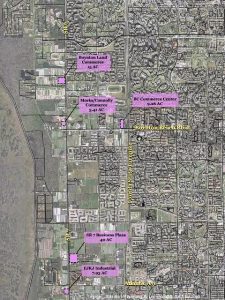Five developers filed land use amendments for industrial development in the Agricultural Reserve in southwest Palm Beach County.
All five applications are in response to a county-initiated process to establish a Commerce Future Land Use category in the Agricultural Reserve to allow light industrial projects. The County Commission is set to vote on this in August.
The Agricultural Reserve is traditionally a rural and agricultural area. Most of the development allowed there has been for single-family homes, creating one of the fastest growing neighborhoods in South Florida. Residential developers must set aside land for preservation in the Agricultural Reserve, and industrial developers would be required to do the same.

Five sites in the Agricultural Reserve in Palm Beach County have been proposed for light industrial development.
(MAP CREDIT: JMORTAN PLANNING & LANDSCAPE ARCHITECTURE)
Amid huge demand for industrial space throughout Palm Beach County, all of the industrial land along Atlantic Avenue just east of State Road 7 has been approved for development and there’s a need for more development to serve the residents, said Lauren McClellan, senior project manager for Palm Beach Gardens-based JMortan Planning & Landscape Architecture, which represents all five land use applications.
“Now that most of that pre-existing industrial land has been entitled, it is apparent that the demand for various types of industrial space (including but not limited to office warehouse, landscape services, cold storage, and last mile distribution) continues to grow,” McClellan said. “If the Board of County Commissioners adopts the Commerce language in August these five applications will become requests for the Commerce Future Land Use designation.”
Gunster attorney Brian Seymour, who represents Fort Lauderdale-based BBX Capital Corp. in the largest application, said it was filed so the company could get a head start on the long process of a land use change amendment so it will already be in the works should the County Commission approve the Commerce designation. He noted that the light industrial category would not permit heavy industrial uses or self-storage facilities, but it would be appropriate for small-bay warehouses, last-mile distribution centers, and cold storage.
David A. Menchof, an associate professor of supply chain and operations management at Florida Atlantic University, authored a letter for BBX stating that building last-mile distribution centers in the Agricultural Reserve would reduce traffic because goods can reach residents there faster without having to be delivered from distribution centers further away.
Here’s a look at the five applications:
- State Road 7 Business Plaza: BBX Capital has 40 acres at 9863 and 9773 Happy Hollow Road under contract from Suzanne, Diana, and James Mulvehill. The maximum potential would be 600,000 square feet of light industrial space or 315,000 square feet of flex space with office and light industrial.
- Boynton Land Commerce: The 8471 Boynton Beach Land Trust, led by Peter Patel in Boca Raton, acquired 15 acres at 8421 S. State Road 7 for $8.53 million in 2021. The land use amendment would permit up to 294,030 square feet of light industrial.
- BC Commerce Center: BC Boynton Industrial LLC, managed by Malcolm Butters of Coconut Creek-based Butters Construction & Development and Jon Channing in Palm Beach Gardens, has 9.3 acres at 8255 Boynton Beach Blvd. under contract from Paul B. Dye, Randall Thorne, Kimberly Tiernan, Martha Ely and Randy T. Ely. The land use amendment would permit up to 181,515 square feet of light industrial.
- EJKJ Industrial: Fort Lauderdale-based EJKJ Development LLC, managed by Donald M. Allison and Edward Jackson, paid $3.36 million in April for 7.9 acres on the west side of State Road 7, across from Rio Grande Avenue and just south of Atlantic Avenue. The land use change would allow up to 155,444 square feet of light industrial.
- Morin/Connolly Commerce: Howard C. Morin, the Robert Morin Trust, and Carol A. Connolly are the long-time owners of 3.4 acres at 9819 S. State Road 7, which currently has 4,040 square feet of warehouse and storage space, along with truck parking. The land use change would permit up to 66,843 square feet of light industrial.
The County Commission is also considering a county-initiated land use change to permit apartment projects there.
Source: SFBJ




